Pictures of some of the Packers' top players.

WR Davante Adams

WR Davante Adams

WR Davante Adams

LB Clay Matthews

LB Clay Matthews

LB Clay Matthews
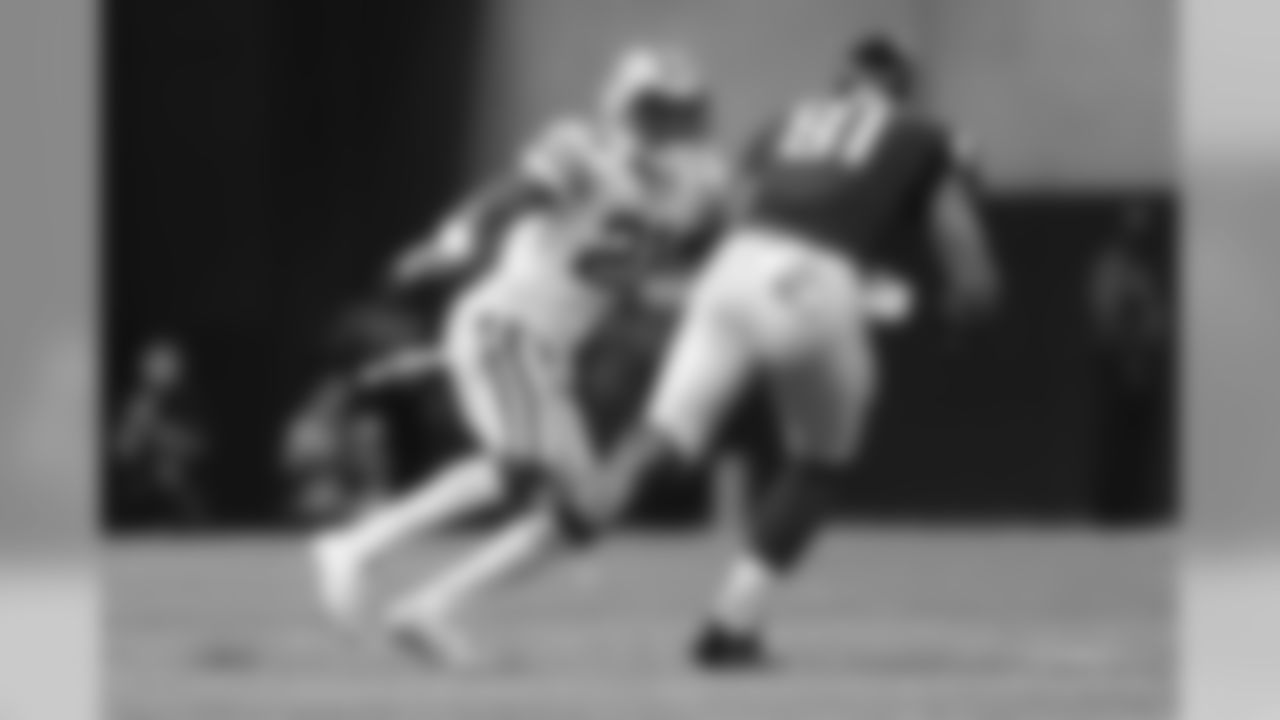
S Ha Ha Clinton Dix

S Ha Ha Clinton Dix

S Ha Ha Clinton Dix

WR Jordy Nelson
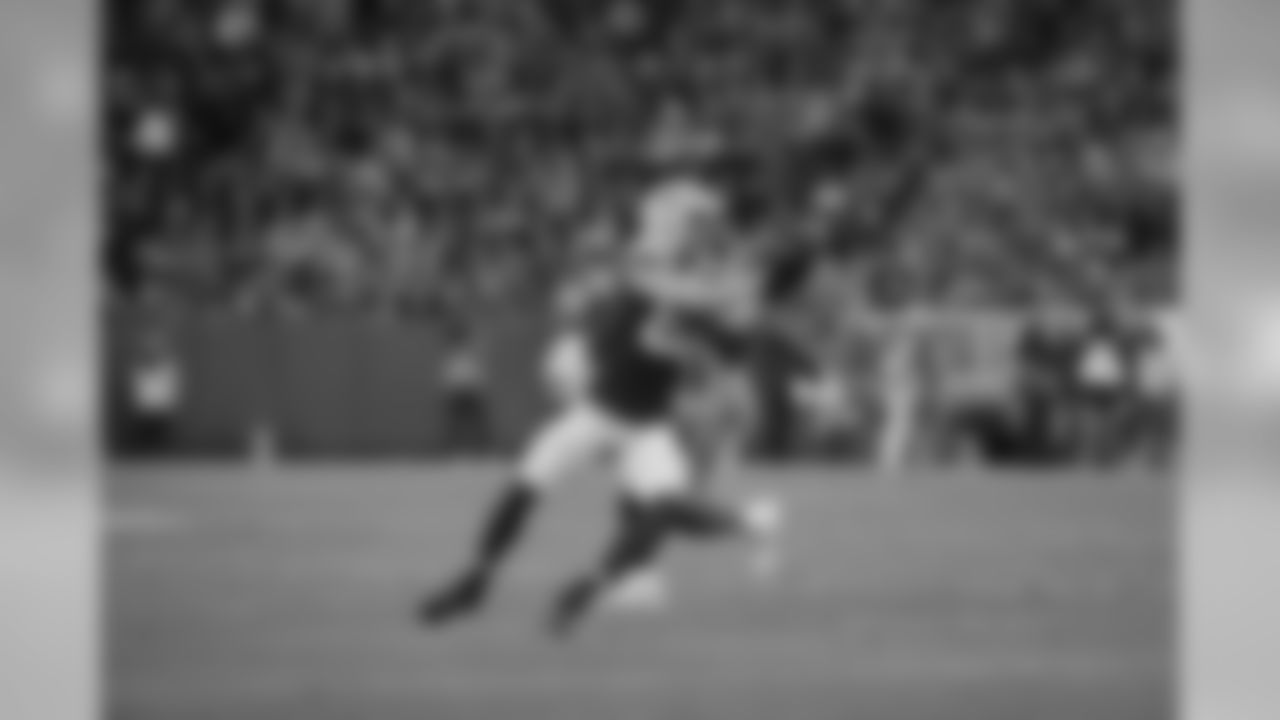
WR Jordy Nelson

WR Jordy Nelson

RB Jamaal Williams

RB Jamaal Williams

RB Jamaal Williams
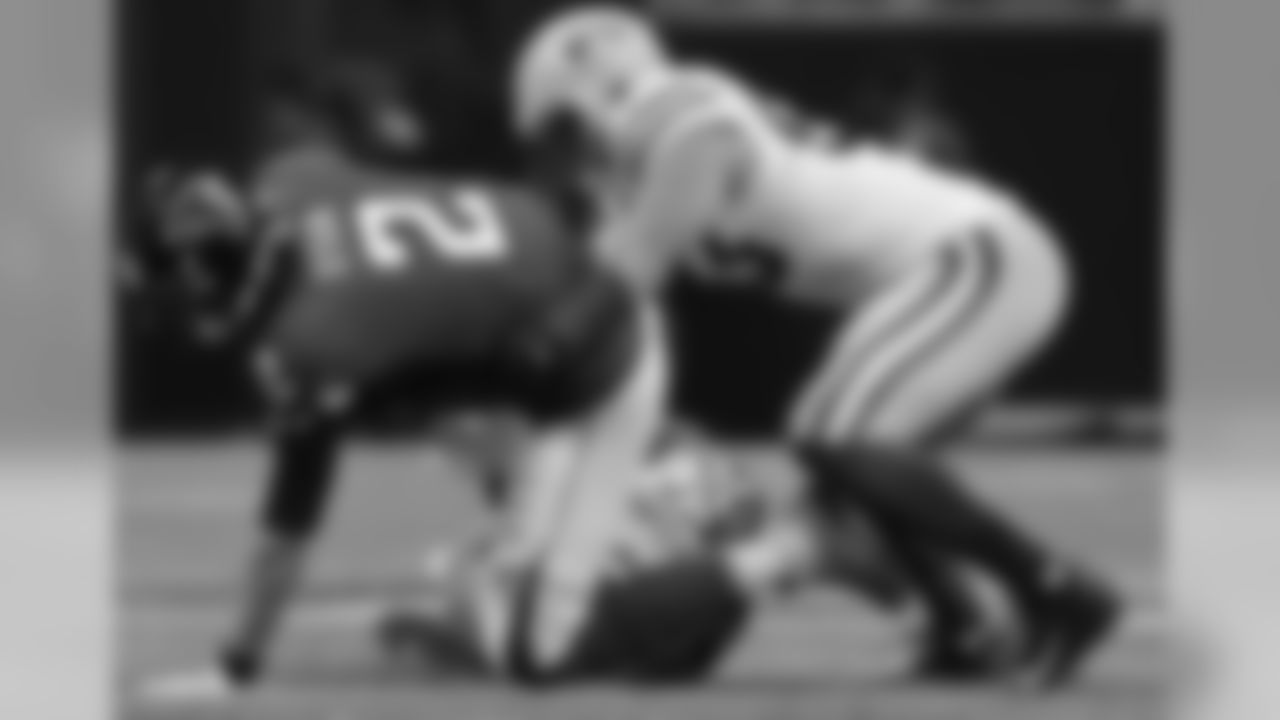
LB Nick Perry
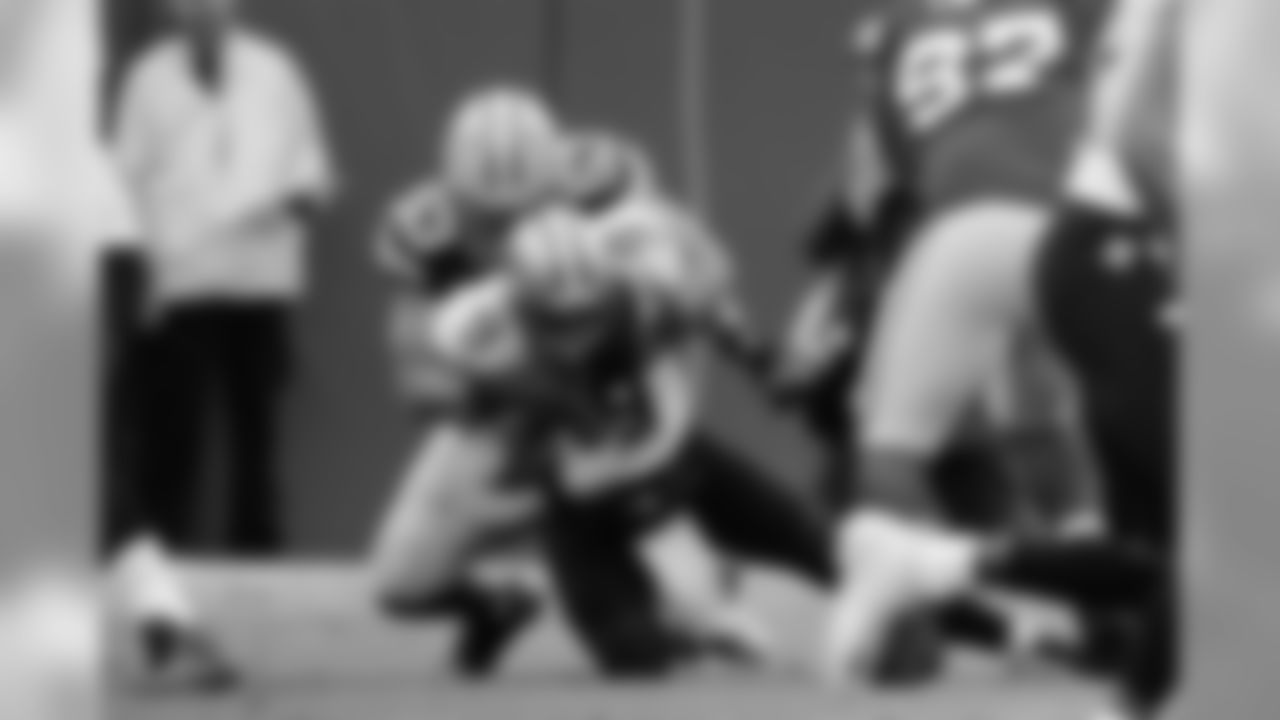
LB Nick Perry

LB Nick Perry
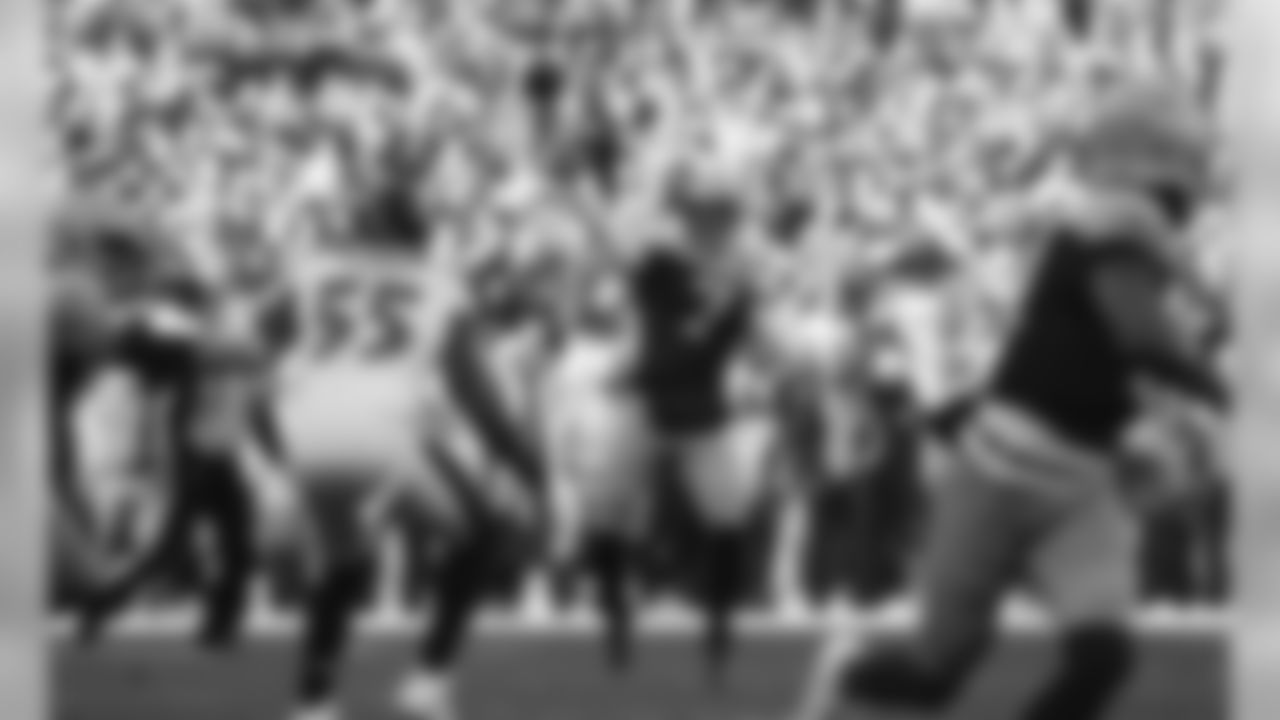
QB Brett Hundley

LB Blake Martinez
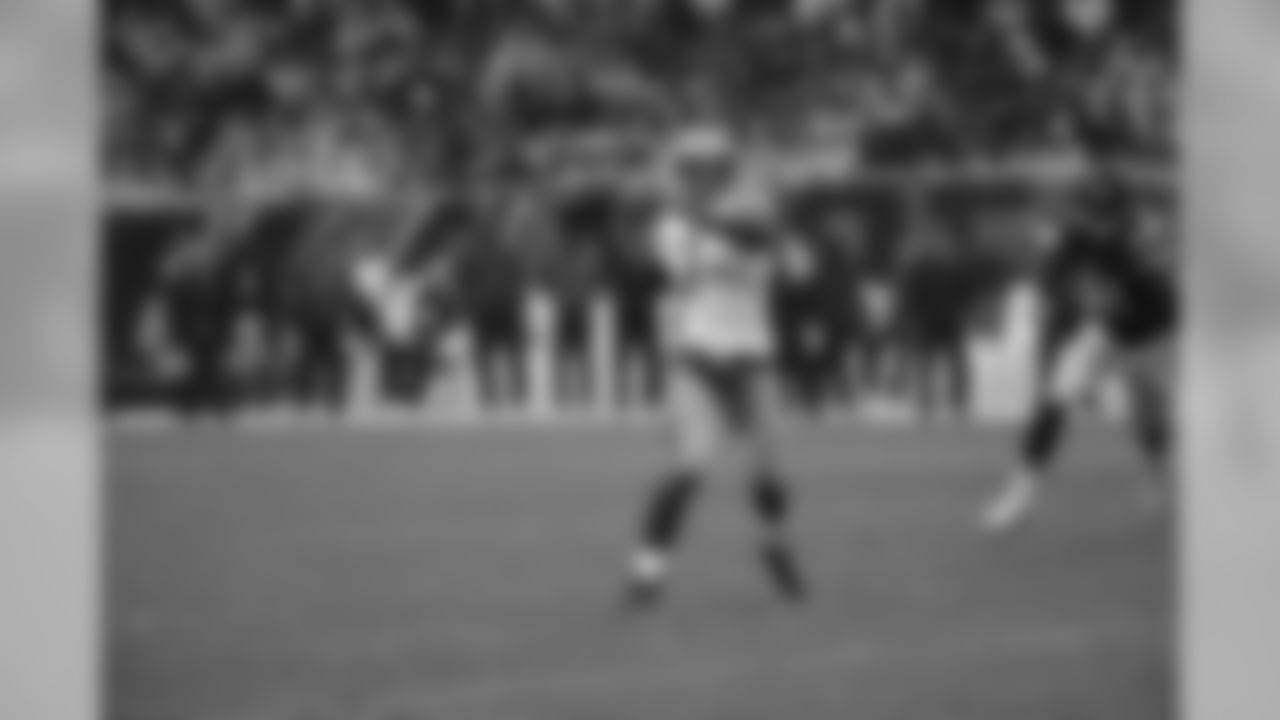
QB Brett Hundley

QB Brett Hundley

LB Blake Martinez

LB Blake Martinez

WR Randall Cobb

WR Randall Cobb

WR Randall Cobb

DT Mike Daniels

DT Mike Daniels
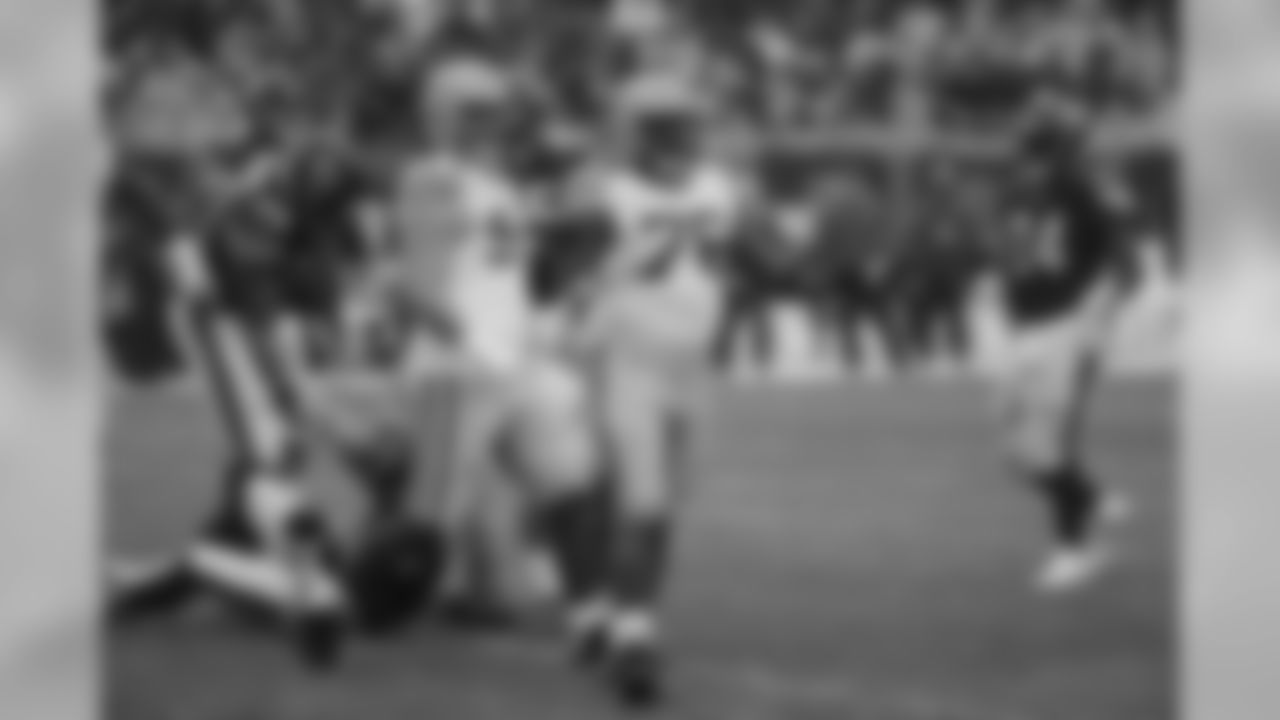
DT Mike Daniels
When the Green Bay Packers came to Tampa in Week Two of the 1992 season, they had Don Majkowski under center and Brett Favre waiting in the wings. The Buccaneers won the game handily, 31-3, and also hastened the future of the Green Bay franchise. Santana Dotson's two sacks were part of the relentless pressure that led to a poor first-half performance by the "Majik Man," which in turn led to first-year Head Coach Mike Holmgren giving his starter the hook at halftime. In came Favre to toss his first passes as a Packer after being acquired in an offseason trade with Atlanta.
Favre's very first throw for Green Bay was a completion…unfortunately it was completed to one Brett Favre. Defensive end Ray Seals tipped the pass in the air and Favre grabbed it before being hauled down for a seven-yard loss by Broderick Thomas. Favre would go on to complete eight of 14 passes for 73 yards and one interception.
Needless to say, things got a lot better for Favre and the Packers, and fast. Majkowski tore up his ankle just two passes into the Packers' next game at Cincinnati and the young backup came in to lead the team to a 24-23 victory. Favre started Green Bay's next game, as well as the next one and, oh, the next 251 after that. Favre's streak would eventually hit 297 straight starts, but the last 44 came with the Jets and the Vikings after his brief retirement after the 2007 season. As Favre left Green Bay, Aaron Rodgers stepped in and started his own streak.
Rodgers hasn't been quite as indestructible as Favre, missing starts in the 2010, 2011 and 2013 seasons. However, he's been healthy and ready to go for each of the last four Buccaneers-Packers games, in 2008, 2009, 2011 and 2014. That means the Buccaneers have faced only two starting Green Bay quarterbacks in the last quarter-century.
That's about to change. Rodgers is currently on injured reserve with a shoulder injury, and while he may return to the active roster before the season is out he's not eligible to do so yet. Therefore, Brett Hundley will remain at the helm of the Packers' offense when the Buccaneers visit Lambeau Field this Sunday afternoon.
Rodgers won his last two starts against the Buccaneers but it was Favre that really opened up Green Bay's advantage in the all-time series during a run from his first start against Tampa Bay (later in that 1992 season) through 1998. In that span, the Packers went 11-1 versus the Buccaneers. The entirety of the rest of the regular-season series is a dead tie: 20-20-1. As you can see, that dead tie includes an actual tied game, the only one in Buccaneers franchise history.
Of course, you can't just excise those dominant-Favre years from the record, so Green Bay's overall edge is 31-21-1, and the Packers also won the only postseason meeting between the two teams, after the 1997 season. More on that below.
The first 15 years of the series was fairly even, with the Packers taking the first three games in 1977-78 but the Buccaneers responding with five wins in the next six meetings, sandwiched around the only tie in Tampa Bay annals. The Packers had a five-game run (1984-86) and the Bucs followed with a four-game streak (1987-89), but again it was pretty much a back-and-forth affair before Ron Wolf stole Favre from the Falcons. Beginning in 1997, the Bucs rose to prominence after a long streak of losing seasons and the series once again evened up, though Tampa Bay still couldn't find a way to win at Lambeau Field for a decade and a half (more on that below). Since league realignment in 2002 took the Bucs to a new division, Tampa Bay has had the upper hand, winning four of six meetings.
It started innocently enough in 1977, when the Buccaneers were starting to pull together the defense that would be dominant by 1979, but at the time the franchise was still looking for its first win. The Packers came to Tampa in October and took home a 13-0 decision despite gaining just 218 yards of offense. The Bucs got only 188. Tampa Bay's first trip to Lambeau Field came the next year, and it was another "offensively-challenged" game on both ends (170 yards for the Buccaneers), but this time Tampa Bay scored and even had a fourth-quarter lead after a Ricky Bell touchdown run. A bad snap had kept Czeslaw Bolesaw Marcol (also known as Chester) from kicking an extra point in the first quarter, but he got shot at a 48-yard field goal late in regulation and nailed it for a 9-7 Packer win.
Tampa Bay's first win in the series came on their next trip to Green Bay, in 1979. In fact, the 21-10 decision was the third of five straight wins to start the '79 season, which would propel the team to the playoffs for the first time. Ricky Bell ran for 97 yards and scored on both a run and a pass to lead the Bucs to victory, and he would also run for 167 yards and score again on a reception when the Packers came to Tampa for the rematch. The Bucs won, 21-3.
The next game between the two is interesting in that neither team came out on top. The Packers came to Tampa in October and, amazingly, scored only 14 points despite rolling up 569 yards of offense, still the fourth-most ever allowed by a Buccaneer team. Green Bay QB Lynn Dickey threw for 418 yards but was picked off twice, and that was doubly important because LB Richard "Batman" Wood returned one of those interceptions 55 yards for the Bucs only points in the first three quarters. Doug Williams ran it in from five yards out to tie the game in the final period. In overtime, Green Bay won the toss and had three possessions, two that reached midfield and one that set up a 36-yard field goal that K Tom Birney missed as time expired.
Tampa Bay pounded the Packers, 37-3, as part of a season sweep in 1981, but the Packers got their revenge in the next meeting in 1983 with a 55-14 throttling. The Bucs ran for 210 yards in their big win while Green Bay got 267 yards from Dickey in their win…on only 10 completions! After two straight blowouts, the next two games were both overtime affairs, with each team winning once. Dickey threw three picks in the second game in 1983 but the Packers won, 12-9, on four Jan Stenerud field goals. James Wilder was pretty much the entire Buccaneer offense in 1984, and that was certainly the case when the Packers visited Tampa and Wilder ran 43 times for 172 yards and caught four passes for 44 yards. One of those was a 15-yard carry that started the game-winning drive in overtime in a 30-27 final.
The next game of particular note between the two teams came on the first of December in 1985, which proved to be one of the worst days ever for football. A blizzard dumped a foot of snow on the field before the game and kept right on falling, and even with some of the hardiest fans in the game the Packers saw less than 20,000 make it to Lambeau Field. Green Bay handled the conditions far better than the visitors from Florida, rolling up 512 yards to the Bucs' 65. That's one of just eight games in NFL history in which one team surpassed 500 yards and the other didn't get to 100. Steve Young ran all over the field but only completed eight passes while absorbing five sacks, as the Packers won, 21-0.
From Nov. 1, 1987 through Sept. 10, 1989, the Buccaneers recorded four wins over the Green Bay Packers…and three combined against every other team in the league. Obviously, this was not an era of great success for either team. In 1992, the Buccaneers won their first game under new Head Coach Sam Wyche with a 23-7 downing of the Phoenix Cardinals, then welcomed Green Bay in town the following weekend. This one went even better for Wyche's crew, as Vinny Testaverde completed 22 of 25 passes (a team-record 88.0%) for 363 yards, two touchdowns and no interceptions in a 31-3 blowout. The Bucs had a scoring edge of 54-10 after Wyche's two games; unfortunately, they would be outscored, 355-213, the rest of the way.
We glossed over what would go on to happen over the next six seasons with Favre at the Packers' helm, as Green Bay rose to contender status before the Buccaneers' own breakout season…and we're going to gloss over it again. No reason to relive that run of misery. The Bucs' lone victory in that 13-game span (including playoffs), was a 13-10 overtime decision in December of 1995 that proved to be Wyche's last win as the Bucs' head coach. Errict Rhett ran for 118 yards, Horace Copeland caught eight balls for another 122 and the Bucs used the only possession in overtime to set up a 47-yard field goal by Michael Husted. See, we told you about one of the games in that stretch. Our work here is done.
Tampa Bay's own breakout came in 1997 but the one hurdle they could not clear that season was Favre and the Packers. The Bucs lost three times to their division rivals, including once in the second round of the playoffs, and were 11-4 against everybody else. Favre threw for two touchdowns apiece in 21-16 and 17-16 wins in the regular season but the Bucs defended him far better in Green Bay in the divisional playoff round. Favre was held to 15 completions and 190 yards in 28 attempts and was picked off twice by Donnie Abraham and sacked three times by his friendly nemesis, Warren Sapp. Still, the Packers did enough to take a 21-7 victory.
The next four seasons were similar: All were home-and-home splits, and six of the eight games were decided by five points or less. In 2000, Martin Gramatica kicked field goals of 54 and 51 yards in the fourth quarter of the game in Tampa as the Bucs rallied for a 20-15 victory. However, Gramatica's last field goal attempt of the regular season also came against the Packers and it proved to be a critical miss. Tampa Bay went to Lambeau Field in the final week of that season trailing the Minnesota Vikings by one game in the standings, 11-4 to 10-5. The kickoff temperature on that Dec. 24 afternoon was 15, with a wind chill reading of -15, but the Buccaneers took the game to a 14-14 tie in the fourth quarter. An interception by LB Jamie Duncan set up Gramatica for a 40-yard game-winning try with 14 seconds to play, but Gramatica pushed it just to the right and the Packers went on to win in overtime. The Vikings also lost that week to the Colts, which meant that, had the Bucs beaten the Packers, they would have won the division and earned a first-round bye. Instead they got a Wild Card ticket to Philly and a quick 21-3 exit from the postseason.
The Bucs win over Green Bay at Raymond James Stadium the following year was notable for its things of great length. The first was a 98-yard interception return for a touchdown by LB Shelton Quarles that remains the longest scoring play of any kind in franchise history. The second was a 95-yard march capped by a Mike Alstott TD run that was, at the time, the longest scoring drive in franchise history. That was all the points the Bucs needed in a 14-10 win. Green Bay won the rematch at Lambeau thanks to a 55-yard punt return touchdown by Allen Rossum that gave the home team a 21-20 comeback victory.
Even though the two teams parted ways, divisionally speaking, in 2002, the Packers were on Tampa Bay's docket that season. Green Bay came to town near Thanksgiving and the Buccaneers were thankful to be able to intercept Favre four times, two by Brian Kelly. The Bucs won that game, 21-7, on their way to Super Bowl glory in January. The Packers came back in 2003, as well, but this time they took home a 20-13 win despite the Bucs' Thomas Jones running for 134 yards and the team picking up 8.6 yards per carry. Sadly, that game also marked the end of an incredible run for Tampa Bay's defense, which had recorded at least one sack in 69 consecutive games before being stone-walled by the Packers' line.
The Bucs went back to Lambeau Field in 2005 and got their first victory in the state of Wisconsin since 1989. Rookie RB Cadillac Williams, in the midst of an historic three-game start to his rookie season, rambled all over the Green Bay turf for 158 yards on 37 carries. Two Joey Galloway touchdown catches and two Will Allen interceptions did the rest in a 17-16 Buc decision, though it took Allen's second pick late in the game and seven more runs from Williams to kill the clock.
The Packers came back to Tampa in both 2008 and 2009 but left disappointed on both occasions. The first was during Rodgers' first season as the starter, but the Bucs would handle the future MVP reasonably well, holding him to 165 yards, sacking him three times and picking him off three times on the way to a 30-21 win. When Green Bay came back in 2009 they were facing an 0-8 Buccaneers team that was giving rookie QB Josh Freeman his first start. That went quite well for the home team, even against a Green Bay team that would finish 11-5 and make the playoffs. Freeman threw TD passes to Kellen Winslow, Derrick Ward and Sammie Stroughter as the Bucs prevailed, 38-28. The Bucs were probably even bigger underdogs two years later when they took a 4-5 record and a three-game losing streak to Lambeau to play a 9-0 Packer team led by the insanely-hot Rodgers, who would finish the season with 45 TD passes and six interceptions. The Bucs put up a huge fight and pulled to within two, 28-26, on a Dezmon Briscoe touchdown catch with 4:31 to play. They also gave Rodgers one of those six picks, courtesy of CB Elbert Mack, but Rodgers had the last laugh with a 30-yard TD pass to Jordy Nelson with less than three minutes to play, taking the final score to 35-26.
Green Bay also has the last laugh in terms of the series as a whole. The Packers escaped the late-December cold of Wisconsin with a Week 16 trip to Tampa and gave themselves an early Christmas present with a 20-3 victory at Raymond James Stadium. The Bucs, in the midst of a six-game swoon to end a 2-14 season, recorded just 109 yards of offense while the Packers had 431 behind Rodgers' 318-yard day and a 44-yard touchdown run by Eddie Lacy. Both Randall Cobb (11-131) and Jordy Nelson (9-113) topped 100 receiving yards.
Bucs-Packers Game-by-Game Record:
| 1977 | L, 13-0 | Tampa |
| 1978 | L, 9-7 | Green Bay |
| 1978 | L, 17-7 | Tampa |
| 1979 | W, 21-10 | Green Bay |
| 1979 | W, 21-3 | Tampa |
| 1980 | T, 14-14 (OT) | Tampa |
| 1980 | W, 20-17 | Milwaukee |
| 1981 | W, 21-10 | Green Bay |
| 1981 | W, 37-3 | Tampa |
| 1983 | L, 55-14 | Green Bay |
| 1983 | L, 12-9 (OT) | Tampa |
| 1984 | W, 30-27 (OT) | Tampa |
| 1984 | L, 27-14 | Green Bay |
| 1985 | L, 21-0 | Green Bay |
| 1985 | L, 20-17 | Tampa |
| 1986 | L, 31-7 | Milwaukee |
| 1986 | L, 21-7 | Tampa |
| 1987 | W, 23-17 | Milwaukee |
| 1988 | W, 13-10 | Tampa Bay |
| 1988 | W, 27-24 | Green Bay |
| 1989 | W, 23-21 | Green Bay |
| 1989 | L, 17-16 | Tampa |
| 1990 | W, 26-14 | Tampa |
| 1990 | L, 20-10 | Milwaukee |
| 1991 | L, 15-13 | Green Bay |
| 1991 | L, 27-0 | Tampa |
| 1992 | W, 31-3 | Tampa |
| 1992 | L, 19-14 | Milwaukee |
| 1993 | L, 37-14 | Tampa |
| 1993 | L, 13-10 | Green Bay |
| 1994 | L, 30-3 | Green Bay |
| 1994 | L, 34-19 | Tampa |
| 1995 | L, 35-13 | Green Bay |
| 1995 | W, 13-10 (OT) | Tampa |
| 1996 | L, 34-3 | Tampa |
| 1996 | L, 13-7 | Green Bay |
| 1997 | L, 21-16 | Green Bay |
| 1997 | L, 17-6 | Tampa |
| 1997 | L, 21-7 * | Green Bay |
| 1998 | L, 23-15 | Green Bay |
| 1998 | W, 24-22 | Tampa |
| 1999 | L, 26-23 | Green Bay |
| 1999 | W, 29-10 | Tampa |
| 2000 | W, 2-15 | Tampa |
| 2000 | L, 17-14 (OT) | Green Bay |
| 2001 | W, 14-10 | Tampa |
| 2001 | L, 21-20 | Green Bay |
| 2002 | W, 21-7 | Tampa |
| 2003 | L, 20-13 | Tampa |
| 2005 | W, 17-16 | Green Bay |
| 2008 | W, 30-21 | Tampa |
| 2009 | W, 38-28 | Tampa |
| 2011 | L, 35-26 | Green Bay |
| 2014 | L, 3-20 | Tampa |
Series Notes:
- Overall Season Series: Packers lead, 31-21-1
- Bucs' Home Record: 14-13-1
- Bucs' Road Record: 7-18
- Current Streak: Lose 2 (2011-14)
- Buccaneers' Longest Winning Streak: 4 (1988-89)
- Packers' Longest Winning Streak: 6 (1992-95 and 1996-98)
- Regular Season Point Total: Buccaneers 853, Packers 1,032
- Most Points in a Game, Buccaneers: Buccaneers 38-28 (2009)
- Most Points in a Game, Packers: Packers 55-14 (1983)
- Most Points, both teams: 69, Packers 55-14 (1983)
- Fewest Points in a Game, Buccaneers: 0, three times, most recently, Packers 27-0 (1991)
- Fewest Points in a Game, Packers: 3, three times, most recently, Buccaneers 31-3 (1992)
- Fewest Points in a Game, both teams: 13, Packers 13-0 (1977)





















